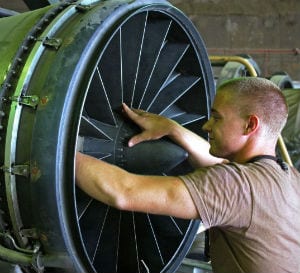Just how much do people like getting the Rolls-Royce treatment? Enough to keep the company growing, apparently, even during a economic downturn.
Rolls-Royce Plc, which manufactures aerospace parts and engines (and isn’t associated with the luxury car company — it branched off in 1987), has managed to not only ride out the recent economic downturn, but actually come out ahead, despite some severe purchasing cut-backs from airlines. In fact the main driver behind Rolls-Royce Plc’s growth hasn’t really been jet engines, but rather the company’s field service operation, TotalCare.
Granted, Rolls-Royce Plc has done a lot to expand its overall product offering, focusing on commercial endeavors and R&D in aerospace and defense. With over 40,000 employees in 50 different countries, R-R Plc is the second-largest aircraft engine maker (next to General Electric), and sells parts to a variety of big-name clients, like American Airlines and the U.S. Department of Defense. But TotalCare, the company’s flagship service program, has been the real profit center.
TotalCare began with the sale of Trent engines, and was marketed along with the original Trent 700 in 1995. Today, about 80 percent of R-R engines sold include TotalCare, and the package itself has overtaken new sales to account for 63 percent of the engines division’s total revenues.
Rolls-Royce’s TotalCare packages have three basic elements: operational support, repair and overhaul, and information management. All of this is promoted by a well-oiled service model, called “power by the hour,” in which Rolls-Royce clients are guaranteed an engine and replacement service for a fixed sum per flying hour. Importantly, Rolls-Royce has developed built-in technology for its jet parts that can detect maintenance issues and automatically fix them or alert a technician — sometimes saving the company from having to actually dispatch a tech at all. Planes are equipped with sensors that constantly beam data to engineers around the world and pinpoint potential problems, preventing the need to strip the engine down. The result is a quality service package that is prompt, precise, and, of course, profitable.
On the strength of TotalCare, Rolls-Royce was also able to move into new markets during the recession: In 2009, the company secured $2 billion in contracts from Air China and Ethiopian Airlines, and garnered substantial business from selling parts to other companies in the Middle East, all while U.S. and European airlines cut back on parts purchasing.
The success of Rolls-Royce’s formula in aerospace manufacturing attests to the importance of customer service operations and their contribution toward corporate revenue. There’s a good reason why the best brands are called “the Rolls-Royce” of their industry. It’s not just a luxury product: it’s a luxury service.
More: Some Go the Extra Mile (or 3,000) for Elite Field Service.
Click here to download a free whitepaper, “Five Steps to Make Field Service Profitable.”


Very interesting perspective on service as a compelling revenue source. Traditionally the big boys over priced service as if they did not want to deal with it and created opportunity for a plethora of third party service providers. As design engineering has matured to the point that products actually last their published life times, especially when they follow the prescribed preventive maintenance, service revenue stream can’t be ignored, even by the best. This challenge to new product revenue has to be supplemented by increased service revenue.